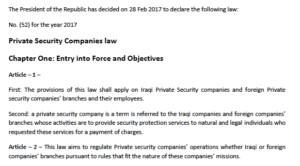Salma Khidir is a Paralegal at Proelium Law LLP. She holds a Masters in Public International Law from Leiden University. Salma is Sudanese and is particularly interested in the geopolitics of the Africa and MENA region and its subsequent effects.
A new Private Security Companies (PSC) Law was issued in Iraq on 28th February 2017. The new law is operational in scope and regulates the work carried out by private security companies (“PSCs”), whereas prior to this, they were regulated under a memorandum issued by the Coalition Provisional Authority in 2004. Below is a summary of what this will mean for Iraqi and foreign PSCs.
According to Article 2 of Chapter 1, the law ‘aims to regulate private security companies’ operations whether Iraqi or foreign companies’ branches pursuant to rules that fit the nature of these companies’ missions’. Unlike the memorandum issued by the Coalition Provisional Authority in 2004, the new law is specific in its operational scope, including how to obtain a licence, the process of employment in a PSC, the company’s obligations and penalties; all very important things to be aware of in order to run effectively and legally in Iraq.
Chapter 2 of the new law lays out what a PSC needs to do to obtain a licence. Interestingly, under Article 5 of the chapter, it is only Iraqi PSCs that are to be granted licences, though it further stipulates that ‘it’s possible at absolute necessities to grant foreign private security companies’ branches an operational licence…’. It is under Article 8 of the Chapter that lays out the requirements for an application for a licence, from both an Iraqi PSC and a foreign PSC, respectively. Though some similarities remain, some notable differences are the amounts for the bank bond required, with an Iraqi PSC’s amount being 250 million IQD and the foreign PSC’s amount being 1 billion IQD.
Further articles of note in the new law are Articles 14 and 15 of Chapter 4, on employment. By contrast, these two articles are quite different. A foreign PSC should generally be aware of how much more they have to do to register their employees with the Iraqi authorities, and should, therefore, allow more time in the process of establishing themselves in Iraq. Don’t underestimate how difficult the process is.
Chapter 7 and Chapter 9 go together in understanding and protecting a PSC. Chapter 7, outlining a PSC’s commitments, stipulates a company’s obligations in Iraq as a company, but also delves into particulars such as the type of documents that must be submitted to be checked by the authorities (Article 22) and, importantly, what the company is prohibited from (Article 23). Chapter 9, outlining the penalties that the company may face, ranges from fines to withdrawing or suspending a company’s licence, with additional penalties that include obtaining a bank bond. These two chapters are pivotal to understand, in order to continue functioning in tandem with the law and to run, long-term, in Iraq.
Finally, Articles 39 and 40 of Chapter 10 are of note as they address the Coalition Provisional Authority’s memorandum (17) for the years 2003 and 2004, and the PSCs that were regulated under it. These articles state that the memorandum no longer applies to the PSC and its employees and that the PSCs should make provisions to comply with the new law.
Read the PSC Law in English or in Arabic.
Need advice?
If you’d like further information, or to discuss working with us, please get in touch







